WE PUBLISH TAX STRATEGIES FOR…
FEATURED CONTENT
Should You Switch Your Work Strategy for Tax Planning Season?
If you’re like most tax professionals, you’re probably working tax-prep season hyper-focused and -vigilant, refusing to hit pause except on absolute demand. You’re keeping a sharp eye on the ball, the players, and the end goal: maximizing your resources and providing impeccable service to your clients. Now, when you have lots of familiar, practiced work to do in little time, working like this can produce great results. However, tax-prep season is ending, and tax-reduction planning season is beginning. Therein, hyper-focus, hyper-vigilance, and workdays, weeks, and months without meaningful rest can backfire and steal from you the results you hope to produce. That’s because reactively responding to external demands and deadlines (set by clients and the IRS, for example), requires something different from you doing proactive designing and selling high-end tax plans. Consider this, as you shift from tax-prep to tax planning, you: ● Soften your focus on computers, numbers, and speed and sharpen your focus on talking with prospective clients about their finances, their hopes and worries about their business and family, and how you might best serve them. This requires a shift from grinding and discipline to presence and attunement. ● Soften your focus on meeting immediate deliverables and sharpen your focus on developing long-term strategies for products you offer and your business overall. This requires a shift from following rules, structures, and guidance to thinking creatively and working socially. ● Soften your focus on external deadlines and client demands and sharpen your focus on your own ambitions and drive to get things done. This requires a shift from aligning your priorities with others’ agendas to aligning your priorities with your own dreams and goals. Making shifts like these can be challenging, particularly if tax-prep season devours you and you enter tax-reduction planning season depleted and drained. However, taking time now to recharge and reset can help you pivot and produce powerful results in the end. Did Tax Season Devour and Deplete You? When it comes to personal performance in business, I like to contrast two modes of working: Depleted Mode and Resourced Mode. These modes aren’t binary; rather, they’re two ends of a continuum that we all constantly move along. Generally, when you find yourself highly distracted and distractible, pushing yourself to keep going, and working excessive hours to make up for lost time, you’re in Depleted Mode. Tax-prep season unfailingly produces this outcome for the best of tax pros. Exhaustion (or simple tiredness), frustration, and a taxed mind (pun intended) live here. When you’re drawn into your work, interested in the results you produce, and loving what you do, you’re in Resourced Mode. Enthusiasm, creativity, and connection live here. Resourced Mode offers an ideal environment to tax pros for engaging with the demands of tax planning season. You’ve probably seen yourself operate in both of these modes and along the continuum. Many tax professionals start the tax-prep season in Resourced Mode but end in Depleted Mode after months of hyper-focus and -vigilance, both of which you can only sustain in short bursts. There’s nothing wrong with Depleted Mode; most people land themselves there through hard work and commitment. (Incidentally, you can build systems and structures to reduce or avoid Depletion Mode over time, but that’s a topic for another day.) Many people produce great work in Depleted Mode, and that can trick them into thinking it’s effective for every kind of work. You can do tax prep in Depleted Mode, for example, because the work is familiar, somewhat predictable and consistent, and ultimately requires less mental engagement. However, Depleted Mode renders fewer productive results in tax-planning season because there you need deeper thought, mental space and physical energy to develop a strategy, a connection to people, and effectively sales. Ultimately, even in situations where Depleted Mode works decently, Depleted Mode can lead to: ▪ Procrastination: Being overworked and under-rested drains your mental capacity and leads to internal resistance on projects that require more mental energy. ▪ Distractibility: Quick changes of focus habituate your brain to prioritize distractions instead of focused work, so you might find yourself putting “easy” work ahead of “valuable” work. ▪ Agitation: Fast pacing can create agitation, or a constant background sense of worry, which can hinder progress when you try to settle into something that requires deeper thinking, such as tax or business strategy (which requires divergent, non-linear thinking). ▪ Lower pay for more work: procrastination, distractibility, and agitation make it difficult to approach valuable work (higher-paying, more satisfying), leaving you to do easy work instead (lower-paying, less satisfying) so you feel as if you accomplish something. ▪ Cyclical depletion: In Depleted Mode, you produce less per hour, make up for it by working more hours, and stay in Depleted Mode by overworking yourself. Still working in depleted mode? Click here to learn how to shut down the grind and turn on the productivity.
Read MoreCURRENT EDITION

Qualified Opportunity Zones After the One Big Beautiful Bill Act: What’s Changed and What It Means for Real Estate Investors
On July 4, 2025, the One Big Beautiful Bill Act (OBBBA) became law, representing the most significant reform of the QOZ program since its inception. It made the program permanent, tightened eligibility rules, introduced a rural-focused investment vehicle, and imposed robust reporting requirements. For tax professionals and investors, understanding these changes isn’t just about compliance – it’s also about strategy.

Vibe Preparing: Ignoring Partnership Agreement Impacts on K1s
Nothing derails a busy season schedule like being forwarded emails from client’s investors asking “are you sure the loss is allocated correctly?” It can expose a weakness in technical expertise – especially when it’s a partnership K1. Whether the operating agreement includes Safe Harbor or Target Capital allocations is one of the most important places to start for a preparer. And knowing these basics can be the difference between a confident reply or a lost week.
Explore Our Free Articles
Get a taste of our comprehensive tax planning insights with four featured articles, free for everyone.
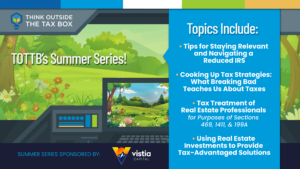
2025 Summer Education Series Event Calendar
We are thrilled to bring you the 2025 Summer Education Series, sponsored by Vistia! All summer long we will be bringing our loyal subscribers monthly webinars featuring some of the brightest minds in tax. Each webinar will feature our usual blend of high-quality education and entertainment and include continuing education

Editor’s Pick: BOI Reporting: A Game of Legal Ping-Pong
For tax professionals trying to guide their clients on Beneficial Ownership Information (BOI) reporting, the last few months have felt like watching a never-ending game of legal ping-pong. Deadlines have been set, overturned, reinstated, delayed, and challenged in court—leaving many businesses (and their advisors) unsure of when, or if, they

CTA on Pause! What Tax Pros Need to Know About the Nationwide Injunction and BOI Reporting
On December 3, 2024, a U.S. District Court judge issued a nationwide preliminary injunction prohibiting FinCEN from enforcing the Corporate Transparency Act (CTA) and its associated Reporting Rule. This injunction halts the January 1, 2025, deadline for Beneficial Ownership Information (BOI) reporting, leaving many tax professionals and business entities questioning
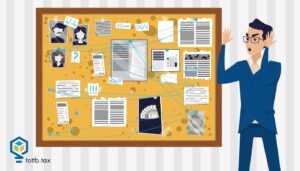
Tax Scams: What You Need to Know About “Sovereign Tribal Tax Credits”
Tax scams come in many shapes and sizes. Some schemes aim to steal money or identities, while others present as legitimate-looking investment opportunities with promises of reducing tax bills. These offers often come from law firms, investment groups, financial advisors, and even sophisticated organizations. They tempt taxpayers with strategies like
Exclusive Webinars for Our Subscribers
As an annual subscriber, you gain complimentary access to our series of expert-led webinars. Each session is designed to provide you with insights, skills, and knowledge to excel in your field. Discover what’s coming up and secure your spot today.
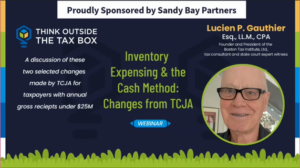
Inventory Expensing and The Cash Method: Changes from the TCJA
Join Lucien P. Gauthier as we discuss these two changes made by the TCJA in depth.
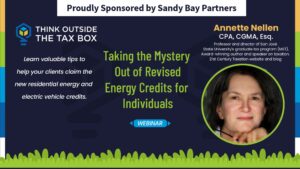
Taking the Mystery Out of Revised Energy Credits for Individuals
Learn valuable tips to help your clients claim the new residential energy and electric vehicle credits.
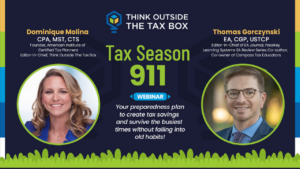
Tax Season 911
Your preparedness plan to create tax savings and survive the busiest of times without falling into old habits!
Don't Miss Our Next Webinar
Mark your calendar and stay ahead of the latest tax planning strategies and regulations
Webinar
TBD
Featured Authors

Amber Gray-Fenner is an Enrolled Agent and tax practitioner specializing in tax returns, planning, and representation for individuals and small businesses. She owns Tax Therapy, LLC in Albuquerque, New Mexico.

Matt Metras, EA, owns MDM Financial Services in NY, specializing in bookkeeping and taxation for cryptocurrency clients. He’s an educator on cryptocurrency taxation and actively engages in community advocacy.

Jeff Stimpson, has been a tax and finance writer for 25 years. Hee contributes to publications like Accounting Today and Financial Advisor. His other credits include sales tax, technology, and practice management, residing in New York.

Annette Nellen is a professor and tax program director at San José State University, with extensive involvement in tax organizations and a focus on tax policy, cryptocurrency, and education.

Peter J Reilly graduated from the College of the Holy Cross, worked in CPA firms like Joseph B Cohan and Associates and CCR LLP, and now runs a tax practice while writing for Forbes.com.

Thomas Gorczynski, EA USTCP CTP, is a tax expert known for speaking and educating on federal tax law. He’s editor-in-chief of EA Journal, co-author of the PassKey Learning Systems EA Review Series, and runs a tax practice in Phoenix, Arizona.
Hear From Our Satisfied Users
Quotes from users who have benefited from Tax Law Pro, highlighting how it has helped them in their tax planning and compliance efforts.

SIMPLIFIED TAX STRATEGIES &
PRACTICAL IMPLEMENTATION
Think Outside the Tax Box provides tax reduction strategies along with practical
implementation advice in order to reduce your clients’ federal tax bill with ease.







